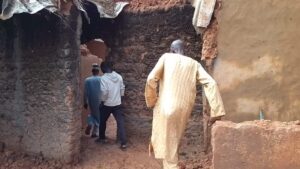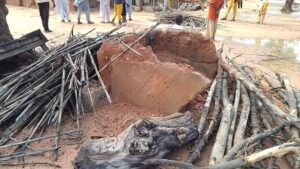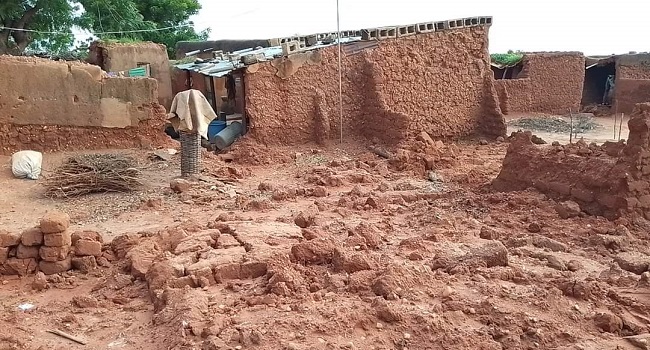In a devastating turn of events, a relentless downpour has led to the destruction of at least 250 houses in Natsinta village, located in the Jibia Local Government Area of Katsina State. The state has been grappling with a week of unprecedented rainfall, which began last Saturday and continued unabated until this past weekend. The torrential rain, which lasted for three days from Thursday through Saturday, has left a trail of destruction in its wake, severely impacting the lives of many villagers.
While it is fortunate that no lives were lost during the heavy rains, the disaster has nonetheless left a profound impact on the community. Several residents sustained varying degrees of injuries, and countless others are now facing the harsh reality of being displaced from their homes. The extent of the damage has left many in a state of distress and uncertainty, unsure of where to turn as they grapple with the aftermath of the storm.
 One of the key factors contributing to the severity of the disaster was the absence of proper drainage systems in the area. The heavy rains overwhelmed the village’s inadequate drainage infrastructure, leading to widespread flooding that engulfed homes and properties. The lack of effective water management in Natsinta has long been a concern for residents, and this recent event has underscored the urgent need for infrastructural improvements to prevent future occurrences.
One of the key factors contributing to the severity of the disaster was the absence of proper drainage systems in the area. The heavy rains overwhelmed the village’s inadequate drainage infrastructure, leading to widespread flooding that engulfed homes and properties. The lack of effective water management in Natsinta has long been a concern for residents, and this recent event has underscored the urgent need for infrastructural improvements to prevent future occurrences.
Mas’udu Lawal, a resident of the village, pointed out that the disaster was exacerbated by the disruption of a crucial drainage channel. “This drainage channel was essential in diverting excess water away from our homes, but it has been neglected and obstructed for years,” he explained. “The rains came with such force that without proper drainage, the water had nowhere to go but into our homes.”
Another victim of the disaster, who identified himself as Abdurrahman Ibrahim, shared the emotional toll that the flooding has taken on him and his family. “We have lost everything,” Ibrahim lamented. “Our homes are gone, and so are our valuables—things we have worked hard for, now lost in the flood. The damage is in the millions of Naira, and we don’t know how we’ll recover from this.”
In the aftermath of the disaster, local officials have begun to take stock of the damage and assess the needs of the affected residents. On Saturday, August 17, 2024, Hon. Mustapha Yusuf, the member representing Jibia Local Government Area in the Katsina State House of Assembly, visited the devastated village. During his visit, he assured the displaced residents that the Assembly is committed to working diligently to secure immediate intervention from the state government.
 Hon. Yusuf also made an appeal to stakeholders across various sectors, including government officials, political leaders, and entrepreneurs, urging them to contribute generously to support those affected by this tragedy. “We must come together as a community to help these individuals rebuild their lives,” he said. “This is a time for compassion, for standing by our fellow citizens in their hour of need.”
Hon. Yusuf also made an appeal to stakeholders across various sectors, including government officials, political leaders, and entrepreneurs, urging them to contribute generously to support those affected by this tragedy. “We must come together as a community to help these individuals rebuild their lives,” he said. “This is a time for compassion, for standing by our fellow citizens in their hour of need.”
The District Head of Daddara, Alhaji Usman Nagoggo, expressed deep concern over the widespread destruction and the impact it has had on the community. “The destruction has sparked confusion and despair among our people,” Alhaji Nagoggo remarked. “Many are struggling to find shelter, food, and basic necessities. This disaster has compounded the already existing challenges of poverty, insecurity, and food scarcity that our people face daily.”
As the community grapples with these challenges, the displaced residents of Natsinta are struggling to find shelter amidst the ongoing crisis. Many have lost not only their homes but also the means to sustain themselves in the coming days. The combination of poverty, insecurity, and food insecurity has made the situation even more dire, leaving many with few options for relief.
In response to this dire situation, there have been calls for immediate and sustained efforts to support the affected residents. The local government, alongside non-governmental organizations and other stakeholders, is being urged to step up and provide the necessary resources to help rebuild homes, restore livelihoods, and ensure that such a disaster does not recur in the future.
For now, the community remains in a state of uncertainty, with many displaced families seeking refuge wherever they can. As they wait for assistance to arrive, the villagers of Natsinta are left to ponder the long road to recovery ahead, hoping that their cries for help will not go unanswered. The resilience of the human spirit will undoubtedly be tested in the days and weeks to come, as these families work to rebuild their lives from the rubble of this disaster.




